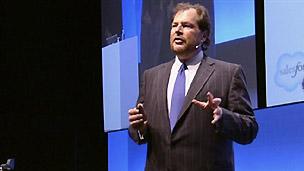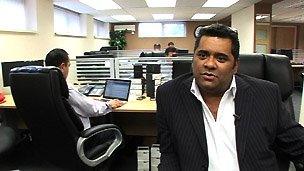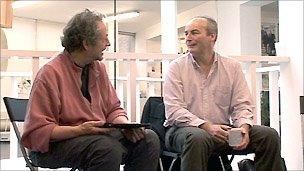Can your social networking profile get you a pay rise?
- Published
In some companies, staff are being encouraged to spend time on social networking sites, such as Salesforce Chatter.
Billionaire IT entrepreneur Marc Benioff believes he has discovered an unforseen (and slightly scary) function in his latest product.
Salesforce Chatter is a software package that helps staff in a company to work together.

Salesforce CEO Marc Benioff believes social networking can revolutionise business
But Mr Benioff says he uses Chatter for something else: to keep an eye on his many employees at Salesforce.com and judge which of them are pulling their weight:
"The benefit to me as an executive is a lot of transparency. You know, email tends to be a very private medium. It's not a great vehicle for sharing information, but social networks are."
Chatter is largely an imitation of Facebook and many of the same principles apply. Employees build personal profiles, form groups, send status updates, and share information openly.
So by watching his Chatter dashboard, Benioff says he can spot - and reward - pivotal individuals who might not have come to his attention in the past:
"They're not our top executives. They're not even our top middle managers. They're the strong individual contributors who are making sure that a deal gets done, or a product gets built, or a bug gets fixed."
Chatter is not the only social networking tool for business - it has competitors like Yammer, Socialtext and LinkedIn, which all work on similar principles.
If these tools take off, then perhaps 'pivotal individuals' within companies really will get noticed, and businesses will become better meritocracies as a result.
But social networking is commonly (and often fairly) accused of being superficial. And if that shallowness finds its way into the office, then the most profile-conscious employees might be favoured while the most creative or productive employees would be overlooked.
Do I look busy?
Scancom is a supplier of Blackberry products and one of 20,000 users of the Chatter platform. The way its employees use social networking reveals some of its advantages, but also a certain lack of depth.

Chen Kotecha says social networking helped his business, but he will not be handing out pay rises
The business runs out of a small, friendly office in Leicester, UK. Its customers, however, are no-nonsense international corporations who place big orders for complex Blackberry products and expect flawless delivery.
Scancom's MD, Chen Kotecha, says Chatter helps his employees to solve problems faster, because they get up-to-date information constantly pushed at them by other people in the organisation.
"I may not know what a particular staff member is working on right now. But I don't want to go and keep asking him. So now I can know from his status update what he's doing. And he knows what I'm doing as well."
"Everybody can comment. Everybody can get involved. And sometimes people know something about the conversation that you didn't expect them to know."
So far so good. But if Mr Kotecha's staff expect to be rewarded simply for being busy on Chatter, then he will be quick to knock the smiley off their face.
"I'm not going to tell an employee 'Hey, you've used the system so here's a pay rise'. Nothing like that".
Mr Kotecha thinks of Chatter as a tool for completing ordinary tasks - the stuff he pays his employees to do in the first place.
A place for ideas
The irony is that if Mr Kotecha's or Mr Benioff's employees did something extraordinary and deserving of a pay rise - such as come up with a new way of making money - then their innovation could well happen outside the scope of Chatter or any other social network.
It would be a shame if a creative bunch of workers were neglected because, by chance, they had their eureka moment in the canteen, rather than on an some official online tool.
But according to a recent survey commissioned by Google, there are many workers around the world who do indeed feel neglected.
Of 3,500 employees in a range of companies and economies, 58% said they would contribute more ideas to their company if they were more likely to be rewarded for them.
And only 12% said they were happy with the collaborative technology available in their workplace.
So the question is, what kind of tool would encourage workers to collaborate more creatively online? Can social networking do it, or is something deeper and more serious required?
The broken wave
Software giants Google and Microsoft have their own online collaborative tools. Google has its Apps, and Microsoft has its Business Productivity Online Suite (aka BPOS).
These tools make it easier for a small, trusted group of colleagues to collaborate on a document, or share a calendar, or access a spreadsheet from their smartphones.
Arguably, there is no limit to depth of these tools. They could be used to create anything. But they boil down to very traditional applications, and they lack the liveliness of social networking.
"Most corporate collaboration tools are designed by people who aren't socially adept", says Gartner analyst Tom Austin.
"Google and Microsoft are populated by engineers and they are failures at social tools."
Austin's view is perhaps borne out by the fate of Google Wave - an attempt to merge document sharing with social networking, which was abandoned due to lack of interest.
Anyone for coffee?

Coffee and a chat at the Centre of Creative Collaboration
Meanwhile, folk at the Centre of Creative Collaboration, a small building near London's King's Cross, are quite proud of the way they do things.
People come here at 10 every Friday morning to drink coffee, share ideas and start collaborative projects - and there have been some real commercial successes.
The Centre is not like social networking, because far from immersing themselves in the distracting babble of daily business, these people deliberately remove themselves from it.
But neither is it like the more 'serious' collaborative tools, because people come here to make new acquantainces rather than stick within a regular trusted team.
The approach is based on 'open innovation' and it is far less structured than any online collaboration tool currently available.
"It's a different process, that's all", says co-founder Brian Condon.
"Just because people are having fun in a pretty informal environment, that doesn't mean they're not creating things that can deliver business advantage."
Perhaps Condon and his colleagues know something the software engineers don't.